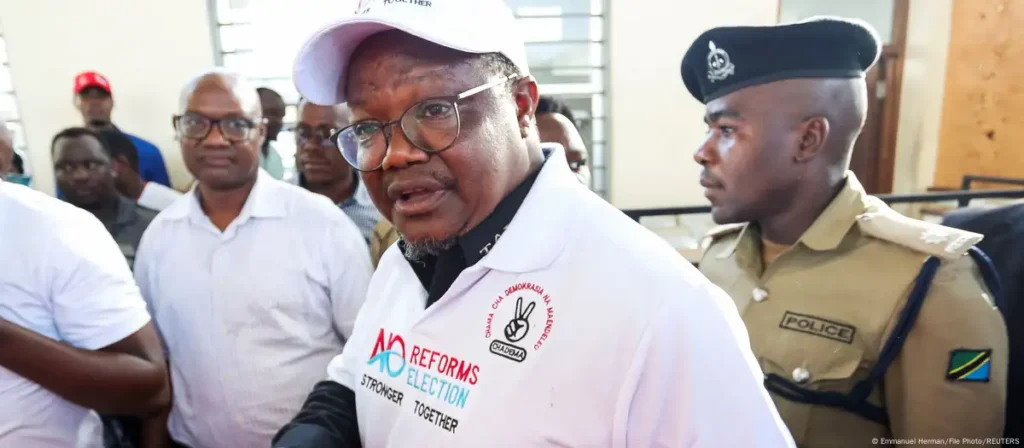Tanzania’s political landscape shifted dramatically on Wednesday after the country’s electoral commission disqualified the presidential candidate of its second-largest opposition party, narrowing the field to President Samia Suluhu Hassan and contenders from smaller political groups.
The Independent National Electoral Commission (INEC) confirmed Hassan and her running mate Emmanuel Nchimbi had been cleared to contest the October 29 presidential election following the successful submission of their nomination papers earlier in the day.
This ruling leaves the race without the participation of CHADEMA, Tanzania’s largest opposition party, which was disqualified in April for refusing to sign the electoral code of conduct. The party had rejected the code as part of its broader campaign demanding electoral reforms.
The commission also declined to accept nomination forms from Luhaga Mpina, the presidential candidate of ACT-Wazalendo, the second-biggest opposition party, according to party officials. The move has deepened concerns about the independence of Tanzania’s electoral process.
After her approval, President Hassan addressed members of her ruling Chama cha Mapinduzi (CCM) party through a post on X, calling for solidarity: “Maintain unity to ensure victory for our party and for God’s permission to return to serve citizens.”
Opposition Faces Crackdown Ahead Of Critical Election
CHADEMA chairman Tundu Lissu, one of Tanzania’s most prominent opposition figures, has been behind bars for more than four months after being charged with treason in April. Lissu denies the accusations. His detention, coupled with a string of disappearances of government critics in recent months, has drawn renewed scrutiny to Hassan’s human rights record. While the president insists her administration is committed to respecting freedoms, critics argue otherwise.

On Tuesday, the Registrar of Political Parties also disqualified Mpina, citing complaints from within ACT-Wazalendo that the party failed to adhere to proper nomination procedures during its primaries. Mpina, a sharp government critic and former CCM lawmaker, defected from the ruling party earlier this month before seeking the presidency under ACT-Wazalendo.
The decision sparked outrage within opposition circles. “This decision is not only shameful but it is raising more questions about the integrity, seriousness, professionalism and the independence of the electoral commission,” ACT-Wazalendo’s Secretary General Ado Shaibu declared in a statement on Wednesday.
The rejection of both major opposition forces has left President Hassan, who assumed power in 2021 following the death of her predecessor John Magufuli, in a significantly stronger position. This election will mark her first direct bid for the presidency, after completing Magufuli’s unfinished term.
Rising Concerns Over Democratic Backsliding In Tanzania
President Hassan was initially praised for softening Magufuli’s authoritarian legacy. Early in her tenure, she lifted restrictions on political rallies and freed several detained opposition leaders, leading to cautious optimism about democratic renewal. But as the 2025 general elections approach, observers note a sharp reversal.
Human rights groups say opposition leaders have been targeted with arbitrary arrests, intimidation, and even abductions. Lissu’s imprisonment, in particular, has become symbolic of Tanzania’s broader crisis of political freedom. International watchdogs warn that the erosion of democratic space risks pushing the East African nation toward dictatorship.
Analysts argue that internal rivalries within CCM and pressure from Magufuli loyalists have influenced Hassan’s pivot toward authoritarian control. Her grip on the ruling party is seen as fragile, prompting harsher crackdowns on dissent to consolidate her power ahead of the polls.
Despite her early image as a reformer, Hassan’s current trajectory raises critical questions about Tanzania’s democratic future. For many citizens, hopes of political inclusiveness have dimmed, replaced by concerns of a return to the repressive governance that many thought ended with Magufuli’s death.
As nominations officially closed on Wednesday, the October election now appears set to proceed without meaningful opposition, casting doubt on whether Tanzanians will be offered a truly competitive democratic process.
READ ALSO: NHIA CEO Reaffirms Commitment to Universal Health Coverage























